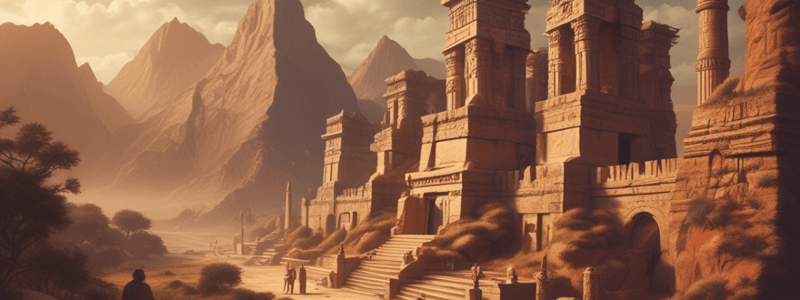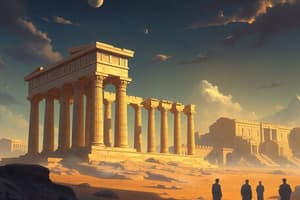Podcast
Questions and Answers
Which ancient civilization is credited with the invention of writing?
Which ancient civilization is credited with the invention of writing?
- Ancient Greece
- Ancient Rome
- Ancient Egypt
- Mesopotamia (correct)
What was a significant event during the Late Middle Ages?
What was a significant event during the Late Middle Ages?
- The Black Death (correct)
- The Crusades
- The Renaissance
- The Fall of the Roman Empire
Who were prominent thinkers during the Enlightenment?
Who were prominent thinkers during the Enlightenment?
- Locke and Rousseau (correct)
- Socrates, Plato, and Aristotle
- Hammurabi and Pythagoras
- Leonardo and Michelangelo
What was a major outcome of the Renaissance?
What was a major outcome of the Renaissance?
What characterized the Industrialization and Imperialism period?
What characterized the Industrialization and Imperialism period?
What was a significant event in the Early Modern Period?
What was a significant event in the Early Modern Period?
Flashcards are hidden until you start studying
Study Notes
Ancient Civilizations
- Mesopotamia (3500 BCE - 539 BCE):
- Invention of writing (cuneiform)
- Development of cities (Ur, Babylon)
- Creation of laws (Code of Hammurabi)
- Ancient Egypt (3100 BCE - 30 BCE):
- Pyramids and mummification
- Hieroglyphics and papyrus
- Pharaonic dynasties
- Ancient Greece (8th century BCE - 146 CE):
- City-states (Athens, Sparta)
- Philosophy (Socrates, Plato, Aristotle)
- Democracy and theater
- Ancient Rome (8th century BCE - 476 CE):
- Republic and empire
- Law and governance
- Architecture and engineering
Medieval Period
- Early Middle Ages (500 - 1000 CE):
- Fall of the Roman Empire
- Rise of Christianity
- Feudalism and chivalry
- High Middle Ages (1000 - 1300 CE):
- Crusades and trade
- Universities and scholasticism
- Gothic architecture
- Late Middle Ages (1300 - 1500 CE):
- Black Death and plague
- Hundred Years' War
- Renaissance humanism
Early Modern Period
- Renaissance (1400 - 1600 CE):
- Revival of classical learning
- Art and literature (Leonardo, Michelangelo)
- Exploration and discovery
- Reformation and Wars of Religion (1500 - 1650 CE):
- Protestantism and Catholicism
- Thirty Years' War
- Rise of nation-states
- Enlightenment and Revolution (1650 - 1800 CE):
- Scientific revolution
- Enlightenment thinkers (Locke, Rousseau)
- American and French Revolutions
Modern Period
- Industrialization and Imperialism (1800 - 1914 CE):
- Industrial Revolution
- Colonialism and empire-building
- Nationalism and militarism
- World War I and Interwar Period (1914 - 1945 CE):
- World War I and its causes
- Rise of fascist and communist regimes
- World War II and its aftermath
- Cold War and Contemporary Era (1945 CE - present):
- Bipolar world order
- Decolonization and globalization
- Contemporary issues and challenges
Ancient Civilizations
- Mesopotamia (3500 BCE - 539 BCE) developed writing (cuneiform), cities (Ur, Babylon), and laws (Code of Hammurabi).
- Ancient Egypt (3100 BCE - 30 BCE) built pyramids, practiced mummification, used hieroglyphics and papyrus, and had Pharaonic dynasties.
- Ancient Greece (8th century BCE - 146 CE) had city-states (Athens, Sparta), philosophers (Socrates, Plato, Aristotle), democracy, and theater.
- Ancient Rome (8th century BCE - 476 CE) was a republic and empire, developed law and governance, and achieved architectural and engineering feats.
Medieval Period
Early Middle Ages (500 - 1000 CE)
- The Roman Empire fell, Christianity rose, and feudalism and chivalry emerged.
High Middle Ages (1000 - 1300 CE)
- The Crusades and trade flourished, universities and scholasticism emerged, and Gothic architecture developed.
Late Middle Ages (1300 - 1500 CE)
- The Black Death and plague occurred, the Hundred Years' War was fought, and Renaissance humanism emerged.
Early Modern Period
Renaissance (1400 - 1600 CE)
- Classical learning was revived, art and literature flourished (Leonardo, Michelangelo), and exploration and discovery accelerated.
Reformation and Wars of Religion (1500 - 1650 CE)
- Protestantism and Catholicism conflicted, the Thirty Years' War was fought, and nation-states rose.
Enlightenment and Revolution (1650 - 1800 CE)
- The scientific revolution occurred, Enlightenment thinkers (Locke, Rousseau) emerged, and the American and French Revolutions took place.
Modern Period
Industrialization and Imperialism (1800 - 1914 CE)
- The Industrial Revolution happened, colonialism and empire-building accelerated, and nationalism and militarism grew.
World War I and Interwar Period (1914 - 1945 CE)
- World War I was fought, fascist and communist regimes rose, and World War II and its aftermath occurred.
Cold War and Contemporary Era (1945 CE - present)
- The bipolar world order emerged, decolonization and globalization accelerated, and contemporary issues and challenges arose.
Studying That Suits You
Use AI to generate personalized quizzes and flashcards to suit your learning preferences.




